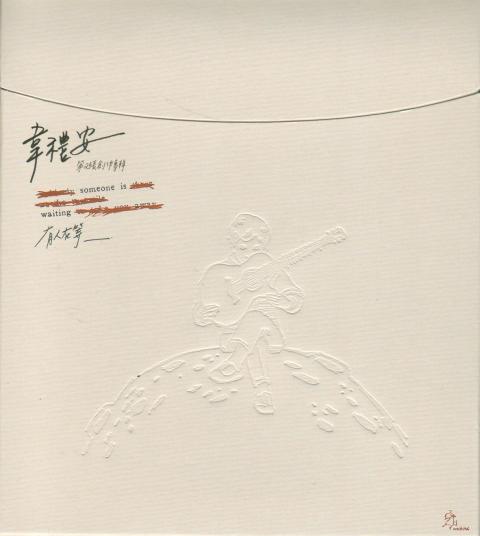Jolin Tsai (蔡依林)
Muse
Warner Music

Two years after the all-electronica Myself, which for this reviewer was hands down the best dance album in Mando-pop history, Jolin Tsai (蔡依林) returns with Muse, her 12th album to date and one that aims to blend art and pop elements. Though such an ambitious musical goal is beyond the reach of most Mando-pop acts, she delivers a polished album.
Tsai continues the practice of commissioning songwriters from the West for her dance songs, this time hiring Norwegian music company Dsign Music to compose five, up-tempo tracks.
For the second half of the album, she gathers together a dream team of mainstream and indie songwriters to reflect her more emotional and pensive mood. This group includes rising singer/songwriter J.J. Lin (林俊傑), three-time Golden Melody Awards Best Female Singer winner Tanya Chua (蔡健雅), Golden Melody winning indie songstress Peggy Hsu (許哲佩), frontman/songwriter Wu Ching-feng (吳青峰) of the popular indie band Sodagreen (蘇打綠) and indie band Tizzy Bac.

The most riveting song is Wandering Poet (詩人漫步), written by Hsu, which rivals Tsai’s trademark ballad Rewind (倒帶), written by Jay Chou (周杰倫).
A review of Tsai’s album would not be complete without mentioning her dance tracks. The lead single, The Great Artist (大藝術家), is amiable but pales in comparison to the glittery gems from her previous dance album Myself. Dr. Jolin is more adrenaline-pumping and contagious, and is certainly destined to become the next entry in her dance classics. Fantasy (迷幻), with lyrics by Sodagreen’s Wu, is another envelope-pushing track in which Tsai advocates for gay rights.
Mando-pop fans will be happy to know that Tsai has developed a confident style, daring to throw a few edgy surprises to both shock and entertain.

William Wei (韋禮安)
Someone is Waiting (有人在等)
Linfair Records
Newly minted Golden Melody Awards Best Newcomer-winner William Wei (韋禮安) ends his military service with Someone is Waiting (有人在等), a highly anticipated sophomoric album.
Acclaimed for his folk pop and soft-rock sound, Wei takes a different approach on this album, venturing into the sassy terrain of R&B, soul and funk. The result demonstrates his versatility as a musician.
The folksy lead single, We’ll Never Know, recounts an ambiguous romance. The piano-driven Still in Love with You (還是愛著你) describes his lingering love. These tracks are possible future KTV hits — though nothing particularly exciting: This is the earnest, down-to-earth Wei we already know.
For nearly half the album, Wei ventures into soul and R&B to show that he’s got the groove. Bombarded (轟) adroitly blends soul, funk and blues to craft a song about Internet anarchy. With One More Try, he delivers a gem so funky that you can’t help but swing your hips to.
Few Taiwanese singers can claim the diversity of musical styles as Wei does on Someone is Waiting. Perhaps someday he’ll shed his charming boy-next-door demeanor and become an all-around entertainer.
Sandy Lam (林憶蓮)
Gaia (蓋亞)
Universal Music
Sandy Lam (林憶蓮) returns to the music scene after a six-year hiatus to deliver her latest outing, Gaia (蓋亞), a world music/pop fusion album that seeks to redefine her image.
Lam, who has been dubbed the spokesperson of “urban love songs” (都會情歌), is lionized for trademark tunes such as Scar (傷痕), I Hear Love Has Returned (聽說愛情回來過) and At Least I Have You (至少還有你).
With Gaia, Lam moves out of her romance ballad comfort zone. Gone are the contagious and heart-wrenching love songs she was acclaimed for, and instead expresses her spiritual views and thoughts on environmental issues. To make the album more personal, she abandoned her past practice of hiring a team of experienced producers, opting instead to build the album brick by brick with emerging Chinese songwriter Chang Zile, (常石磊).
Lam also jettisons her trademark crystalline, soaring vocals to adopt a new style that is by turns laid-back and frenzied; she can be heard whispering, sobbing and screaming.
The lead single Wordless Song (無言歌), penned by Lam herself, expresses her existential concern about the world’s chaos and the need for redemption.
With Gaia, the album’s title track which means “mother earth,” Lam agonizes over the destruction done to the environment. Her hypnotically moody vocal makes it a riveting track.
Other songs are not as thematically grandiose. They convey Lam’s views about life’s joys and woes, triumphs and losses. Red Eyes (紅眼眶) is the only track that resembles a love song and has traces of Lam’s previous romantic style.
This sophisticated and envelope-pushing album shows Lam’s integrity as a singer — she is willing to abandon her tried-and-true formula to bring Mandopop to a new level.

Taiwan Power Co (Taipower, 台電) and the New Taipei City Government in May last year agreed to allow the activation of a spent fuel storage facility for the Jinshan Nuclear Power Plant in Shihmen District (石門). The deal ended eleven years of legal wrangling. According to the Taipower announcement, the city government engaged in repeated delays, failing to approve water and soil conservation plans. Taipower said at the time that plans for another dry storage facility for the Guosheng Nuclear Power Plant in New Taipei City’s Wanli District (萬里) remained stuck in legal limbo. Later that year an agreement was reached

What does the Taiwan People’s Party (TPP) in the Huang Kuo-chang (黃國昌) era stand for? What sets it apart from their allies, the Chinese Nationalist Party (KMT)? With some shifts in tone and emphasis, the KMT’s stances have not changed significantly since the late 2000s and the era of former president Ma Ying-jeou (馬英九). The Democratic Progressive Party’s (DPP) current platform formed in the mid-2010s under the guidance of Tsai Ing-wen (蔡英文), and current President William Lai (賴清德) campaigned on continuity. Though their ideological stances may be a bit stale, they have the advantage of being broadly understood by the voters.

In a high-rise office building in Taipei’s government district, the primary agency for maintaining links to Thailand’s 108 Yunnan villages — which are home to a population of around 200,000 descendants of the Chinese Nationalist Party (KMT) armies stranded in Thailand following the Chinese Civil War — is the Overseas Community Affairs Council (OCAC). Established in China in 1926, the OCAC was born of a mandate to support Chinese education, culture and economic development in far flung Chinese diaspora communities, which, especially in southeast Asia, had underwritten the military insurgencies against the Qing Dynasty that led to the founding of

Artifacts found at archeological sites in France and Spain along the Bay of Biscay shoreline show that humans have been crafting tools from whale bones since more than 20,000 years ago, illustrating anew the resourcefulness of prehistoric people. The tools, primarily hunting implements such as projectile points, were fashioned from the bones of at least five species of large whales, the researchers said. Bones from sperm whales were the most abundant, followed by fin whales, gray whales, right or bowhead whales — two species indistinguishable with the analytical method used in the study — and blue whales. With seafaring capabilities by humans